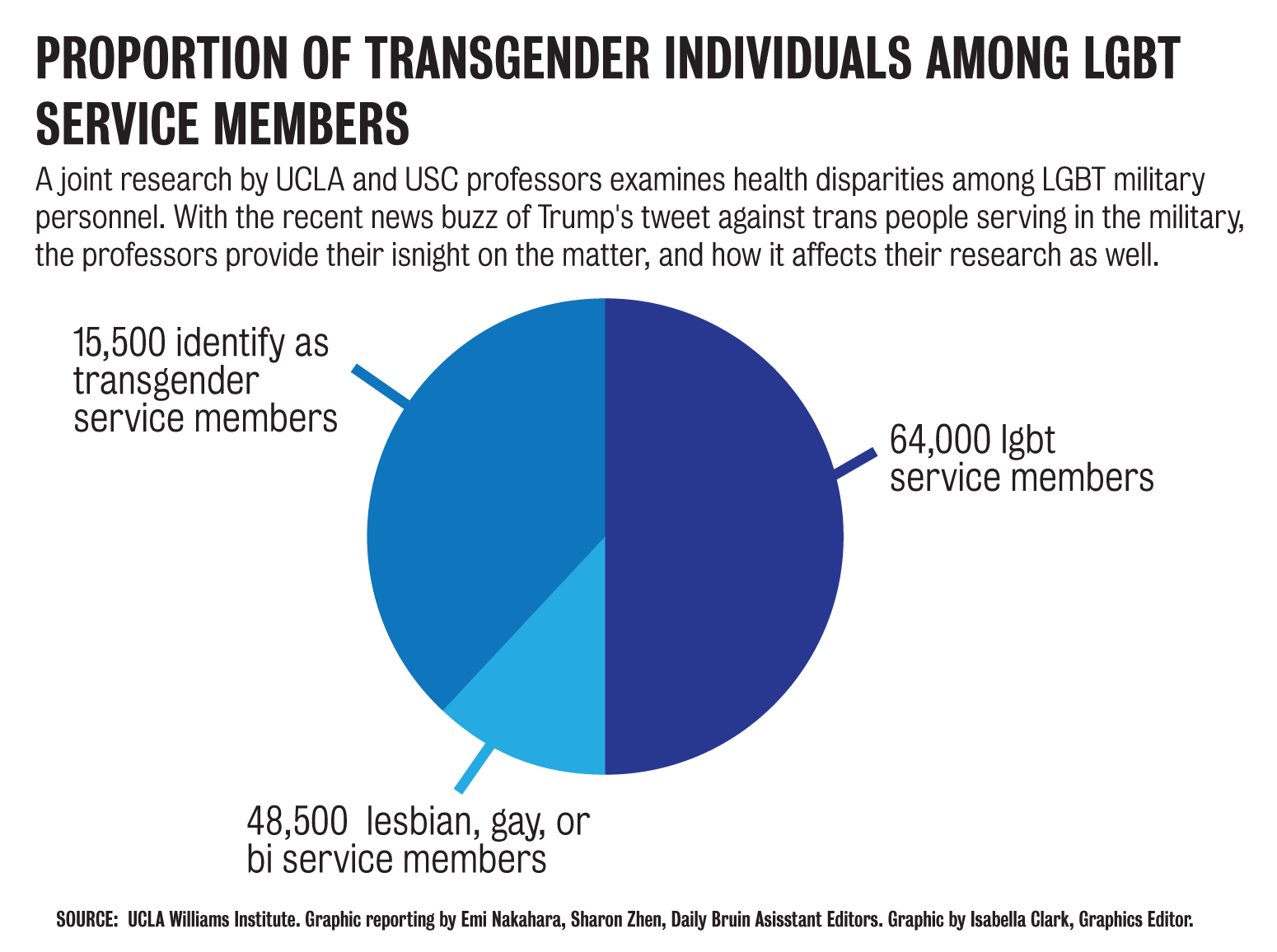Researchers believe Trump tweet could negatively affect LGBTQ study

By Emi Nakahara
July 31, 2017 1:14 a.m.
UCLA and USC researchers conducting a study on LGBTQ military personnel said they were concerned that President Donald Trump’s attitude toward LGBTQ individuals could adversely affect their study.
Trump announced on Twitter on Wednesday that he plans to ban transgender individuals from serving in the military because of medical costs associated with transgender health care.
Ian Holloway, an assistant professor in the department of social welfare at the UCLA Luskin School of Public Affairs, said he thinks Trump’s announcement could harm the research project he is working on.
Holloway is part of a two-year study grant that aims to examine whether LGBTQ service members have higher rates of HIV, sexually transmitted diseases or mental health issues than heterosexual service members, with the goal of influencing military policy decisions to create a more inclusive environment for LGBTQ service members. The total sample will include 480 service members, half of whom are LGBTQ identified, and half of whom are not openly LGBTQ.
Holloway said he thinks transgender service members may hesitate to participate in the study’s survey after Trump’s announcement and added the Trump administration’s stance toward LGBTQ individuals could make participants skeptical of the study’s impact.
Holloway added the purpose of the research was to focus specifically on LGBTQ military personnel.
“(There is) lots of good research demonstrating there are disparities in LGBT populations in other areas of society, but there’s not much research available from those in the military,” Holloway said. “So I think that the question we’re interested in is whether these disparities are also evident in military populations.”
Holloway added he thinks Trump’s stance is unfortunate because the military is the largest employer of transgender individuals. He added he thinks the announcement is similar to former President Bill Clinton’s “don’t ask, don’t tell” policy, which prevented openly lesbian, gay and bisexual service members from serving in the military.
Carl Castro, an associate professor in the USC Suzanne Dworak-Peck School of Social Work and retired army colonel who is also conducting the study, said he expected the more conservative Trump administration to change the way it incorporated LGBTQ individuals into the military.
Holloway said the first phase of the study included qualitative interviews with LGBTQ active-duty members over 40. He added they found that participants were proud and committed to serving despite negative experiences in the military.
“They have had experiences of harassment and discrimination both inside and outside the military and they remain dutifully committed to working in their armed forces,” Holloway said.
Castro, who served when the military followed the “don’t ask, don’t tell” policy, added he thinks decision to ban transgender service members is misguided and wrong.
Castro said the cost for transgender health care is negligible compared with other military costs. He added the military spends five times the cost of transgender medical care on Viagra, a drug that treats erectile dysfunction, for example.
Castro added the military can easily accommodate the amount of transgender service members who cannot serve while transitioning.
“It’s a negligible percentage given the size of the military, where there are over a million active on duty,” Castro said.
Jeremy Goldbach, an assistant professor in the USC School of Social Work and a researcher in the study, said he is not sure whether Trump’s tweet will lead to the Department of Defense changing its policy, which is a complex process. He added he thinks the uncertainty is not good for the military to prepare and function efficiently.
“LGBT service members provide critical services,” he said. “And if they’re not feeling connected because of certain things, it can affect their readiness to serve.”
Goldbach added he thinks transgender service members may experience worse treatment in the military in the near future.
“We need to step back and recognize what (LGBTQ service members) are providing,” he said. “Why would we want to create an environment that treats them different from other service members?”
Castro said the researchers will take into consideration the policy reversal on transgender service members while conducting the second phase of the study, which will survey LGBTQ and heterosexual service members.


